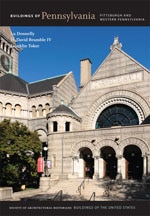Shoaf is one of four company towns built between 1904 and 1917 in southwestern Fayette County by the Henry Clay Frick Coal and Coke Company. Although the Frick company owned many patch towns, most were built by various operators and then purchased by Frick. Shoaf was also the last operating small-size coke works in the nation and the best preserved when it closed in 1972. About thirty houses of the original forty remain. They line the 100 and 200 blocks of Shoaf Road and a parallel street above it, just west of the mine and coke works. Shoaf's drift mine No. 1 opened in 1902, and the company built the houses and a company store. The houses were sold to individual residents in the early 1950s, and the works were sold in 1958 to Max Nobel, who once every year relit a coke oven to celebrate the county's once great industry. More than three hundred ovens survive, the most intact group of beehive ovens in the region, consisting of one battery of double-block ovens and one battery of bank beehive ovens. The lorries, or coal cars, that delivered coal to the ovens from the hillside above still stand on their tracks. A Baltimore and Ohio rail line links Shoaf to other coke ovens in the lower Connellsville region. The surviving brick powerhouse, the supply house, and a machine shop date from c. 1905. The coal tipple was moved here by the Menallen Coke Company in 1963. Because they did not meet clean air standards, the coke ovens were required to burn out in 1972
Writing Credits
If SAH Archipedia has been useful to you, please consider supporting it.
SAH Archipedia tells the story of the United States through its buildings, landscapes, and cities. This freely available resource empowers the public with authoritative knowledge that deepens their understanding and appreciation of the built environment. But the Society of Architectural Historians, which created SAH Archipedia with University of Virginia Press, needs your support to maintain the high-caliber research, writing, photography, cartography, editing, design, and programming that make SAH Archipedia a trusted online resource available to all who value the history of place, heritage tourism, and learning.

